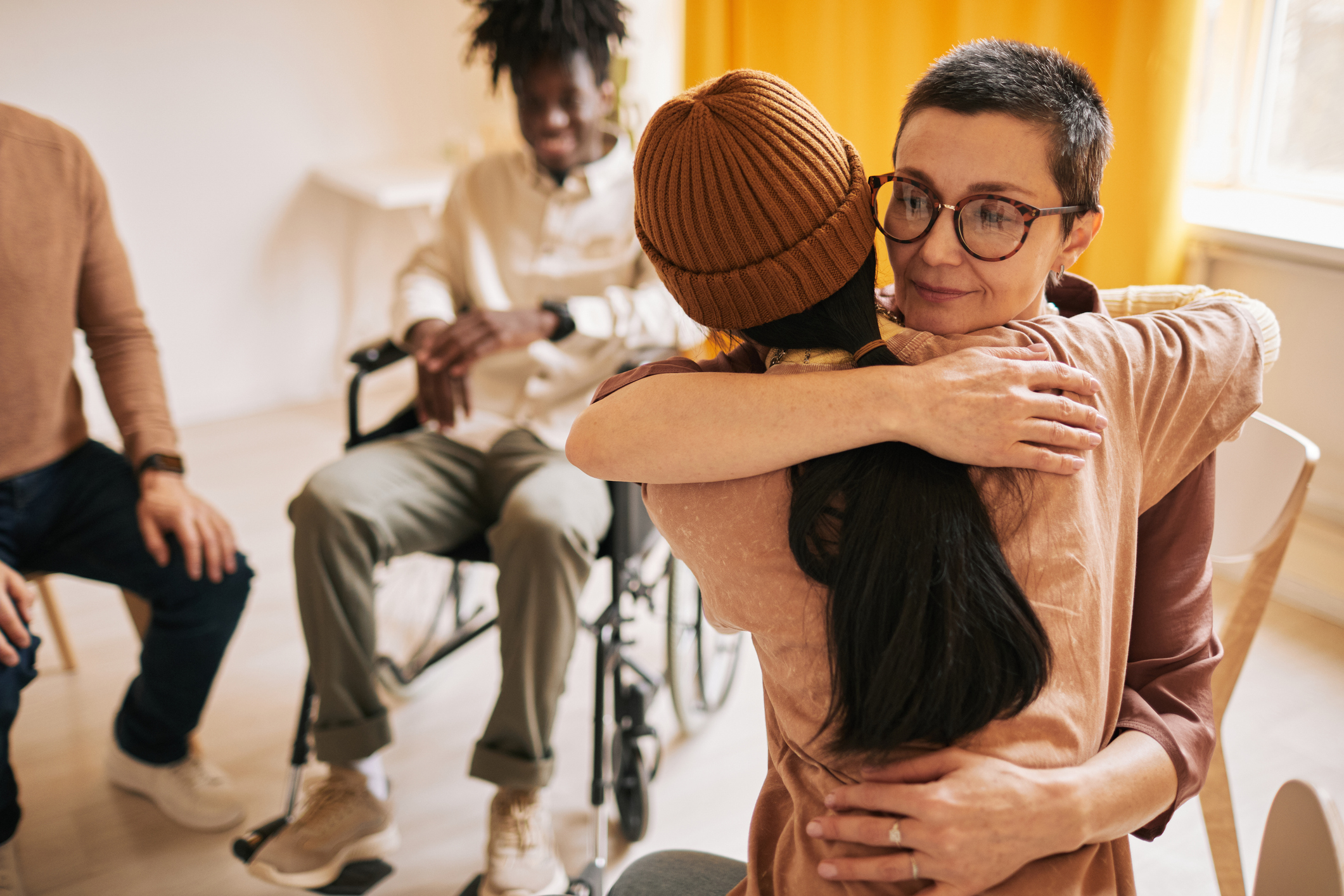
Table of Contents
The Benefits of Grief Support Groups, According to Therapists

Written By: Sarah Fielding

Clinically Reviewed By: Courtney Way
January 28, 2025
4 min.
A grief support group can provide you with connection and understanding while navigating the pain of loss.
Learn more about our Clinical Review Process
Table of Contents
Unfortunately, grief is universal. Everyone will experience some kind of loss at one time or another and need help getting through it. Grief support groups are one space where people can come and find understanding and, well, support in one place while coping with loss.
So, what exactly is a grief support group? In short, these are meetings of individuals who have all experienced a loss. They can operate in person or virtually and might be led by a trained peer facilitator, mental health professional, or spiritual leader, says Charlie Health Contemplative Practitioner Tairesha “Sunflower” Flemister, LMSW. Read on to learn more about grief support groups and their benefits, according to therapists.

You don’t have to heal from grief alone
Virtual treatment programs that include plus peer support.
How do grief support groups work?
Each grief support group, also known as a bereavement support group, will be a little different than another. There are also different types of grief support groups you can join. Some groups focus on a specific kind of death, like the loss of a child or spouse, while others vary based on the age of group members. Flemister notes that she also allows for non-death grief recovery in the support groups she runs. However, there are a few key points that any bereavement support group should have.
1. Safe and confidential space
For starters, it should take place in a safe and confidential space. “The group atmosphere is centered on empathy and respect, allowing participants to express themselves without judgment,” says Charlie Health Group Facilitator Bree Williams, LPCA. “If you’re looking for a place where it’s okay to cry, laugh, and remember without judgment, a structured group can be a safe haven.”
2. Consistent meeting times
A grief support group will also have regular meetings. Each group might have a different duration or frequency at which it meets, whether weekly, bi-weekly, or monthly. This regular schedule can be beneficial for integrating the group into your routine and adjusting to it.
3. Consistent themes
Each of these sessions will also typically have a theme or topic, such as coping strategies or dealing with anniversaries and time for open discussion, says Williams. Part of that will involve giving each person time to share their experience and offer support to each other.
4. Psychoeducation
Psychoeducation can also play a large part in grief support groups, says Flemister. This aspect might cover topics such as types of loss, coping strategies, and how cognitive distortions can occur alongside grief.

When should someone consider joining a grief support group?
Deciding to join a grief support group is a brave and significant step in the grief experience. Some people might join a group shortly after experiencing a loss, while some people might feel they need time before discussing their grief, says Williams. According to Williams and Flemister, some signs you should consider joining a support group include:
- Isolating yourself and having less interest in activities
- Lacking understanding from or struggling to talk with loved ones
- Avoiding thinking about the experience
- Having overwhelming emotions, such as persistent sadness or guilt
- Experiencing burnout
- Eating less
- Having insomnia
- Feeling a loss of purpose
- Using harmful coping mechanisms, such as substance use or overworking
Having people in your life who can relate to your experience can make a tremendous difference. Compassionate friends and family are amazing, but they might not be able to provide the emotional support for your feelings that you need. “If you find that friends or family don’t fully understand what you’re going through, a group of peers in similar situations can offer understanding,” says Williams. “Not everyone is equipped to handle conversations about death and grief, and a support group can fill that gap.”
The benefits of a grief support group
So, what can you expect once you start going to a grief support group? Each person’s experience is, of course, going to be unique. But, Williams and Flemister share some clear benefits you can receive at a grief support group, including:
- Understanding from group members who know what you’re experiencing
- Coping tools to improve well-being
- A space to normalize grief
- General support and encouragement
You can attend these groups alongside other forms of grief counseling. According to Williams, they can be especially effective when done in tandem with individual therapy, as a professional can guide you through tailored coping strategies and help you continue to process your loss. “Ultimately, trust your intuition,” says Williams. “If you’re curious or believe you could benefit from collective support, exploring a grief group is worth considering.”

How Charlie Health can help
If you or a loved one is struggling with healing on the grief journey, Charlie Health may be able to help. While a family member, caregiver, or friend can assist you in navigating the grief journey, a bereavement support group can make a tremendous difference in your well-being. Our virtual Intensive Outpatient Program (IOP) provides more than once-weekly mental health treatment for people who are dealing with serious mental health conditions.
We incorporate evidence-based treatments into individual counseling, family therapy, and group sessions. With this kind of holistic treatment, you can find relief from your mental health struggles. Fill out the form below or give us a call to start today.



